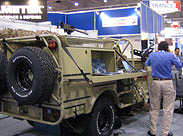 The fact sheet released by the State Department’s Bureau of Political-Military Affairs on the defense trade treaty recently signed by President Bush and Australia’s Prime Minister Howard provides few details on what the treaty says. Fortunately, a detailed FAQ on the treaty was posted on the Australian Prime Minister’s website. Here are some of the more interesting portions of the FAQ.
The fact sheet released by the State Department’s Bureau of Political-Military Affairs on the defense trade treaty recently signed by President Bush and Australia’s Prime Minister Howard provides few details on what the treaty says. Fortunately, a detailed FAQ on the treaty was posted on the Australian Prime Minister’s website. Here are some of the more interesting portions of the FAQ.
First, unlicensed exports under the treaty will still require governmental notification:
Under the Treaty, US exporters will only need to advise the State Department that they have engaged in an eligible defence export activity; they will not need to apply for a licence.
Second, although government-to-government sales under the Foreign Military Sales programs are not addressed by the treaty transfers of technical data relating to the approved FMS equipment will not be required:
The arrangements for approving the export of US defence equipment to Australia on a government-to-government basis under the Foreign Military Sales (FMS) program will not be included under the Treaty. But once the equipment has been received in Australia, retransfers of the FMS-origin technology within the approved community of Australian companies will be permitted without the need for further approvals, significantly enhancing our ability to support this equipment in country and creating improved opportunities for Australian companies.
Third, the treaty permits unlicensed exports to companies in the “approved community.” The FAQ provides more detail on the requirements to be in that community. An Australian company would be excluded if
– There is a serious failure to comply with Australian export control laws and regulations and/or the commitments undertaken in joining the approved community;
– A company fails to meet its security obligations under the Defence Industry Security Program;
– There is a failure to provide written notification of material changes in the facts provided with the company’s application for qualification;
– There is a significant risk that there will be unauthorised diversion of articles or data provided under the treaty;
– There are false statements, misrepresentations or omissions of fact in the application or export related documentation, or significant failures to provide or maintain records of US defence articles and data in the company’s possession.
Fourth, the treaty will include verification procedures:
The Treaty will stipulate the setting up of a compliance and audit regime, the details of which have yet to be mutually determined.
Finally, as with the analogous U.S.-U.K. treaty, the treaty with Australia will exclude “highly sensitive exports” although there is not yet any agreement as to what articles will be deemed to be “highly sensitive.”
 The Guardian had an interesting dispatch from this year’s Defense Systems and Equipment Show:
The Guardian had an interesting dispatch from this year’s Defense Systems and Equipment Show:
 Posted by
Posted by  Category:
Category: 

 The
The  Last Friday, the UAE
Last Friday, the UAE  An
An  Amnesty International, according to a
Amnesty International, according to a 

